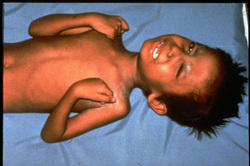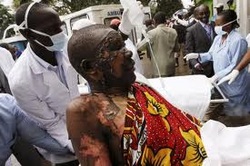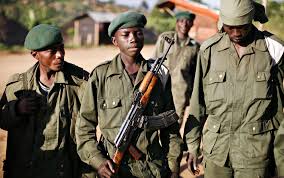In this informative lecture, Sherry Wren, course co-director and Professor of Surgery at Stanford, and Michele Barry, Professor of Medicine at Stanford, discuss challenges in global health. Dr. Wren recounts her personal experience working in the Democratic Republic of Congo, and Dr. Barry highlights neglected policy issues on the international global health agenda.
Dr. Pizzo opens the evening by commenting on the importance of global health and the reality that as the world gets smaller global health becomes a shared concern. Aside from our self interests, there is the basic need for concern about the vast disparity in disease incidence and the impact it has on lives elsewhere. Here the focus will be on areas that lack healthcare as we know it and which struggle to distribute the limited resources they have.
Dr. Sherry Wren begins her talk with a warning that graphic images may be presented (and I will aim to find the worst one I can, no worries). Her experiences take her to the Congo, a land with a rich history that has inspired more than one top tier author. Because the Democratic Republic of the Congo isn't all that democratic, there is a large volume of internally displaced people who are forced to live in virtual refugee camps.
Dr. Wren notes that Doctors Without Borders sees 10 million patients a year, making the organization the largest healthcare organization in the world. But they are a short term fix, not a long term solution. Dr. Wren, a surgeon herself, points out that there is a severe deficit of surgeons in these regions, despite a high level of need due to a significant number of traumatic injuries.
Dr. Sherry Wren begins her talk with a warning that graphic images may be presented (and I will aim to find the worst one I can, no worries). Her experiences take her to the Congo, a land with a rich history that has inspired more than one top tier author. Because the Democratic Republic of the Congo isn't all that democratic, there is a large volume of internally displaced people who are forced to live in virtual refugee camps.
Dr. Wren notes that Doctors Without Borders sees 10 million patients a year, making the organization the largest healthcare organization in the world. But they are a short term fix, not a long term solution. Dr. Wren, a surgeon herself, points out that there is a severe deficit of surgeons in these regions, despite a high level of need due to a significant number of traumatic injuries.
So approximately 6 million have died so far (2010) and are dying off at a rate of 1,000-1,500/day. Part of the reason being that they are agrarian and, when forced to flee, suffer from severe food shortages/malnutrition, which in turn will weaken the immune system. Add in residing in a refugee camp surrounded by others carrying infectious disease and it gets ugly fast. Part of the problem traces back to the Hutu Interahamwe who were driven out after the genocidal slaughter of the Tutsis and who landed in the Congo. There are about 20 factions fighting within the area. Even worse, the Congo is a resource rich region so although they should have sufficient resources to provide a high standard of living, corruption and greed ensure there's no plan in place to use the resources for the good of the whole society.
Equipment limitations are severe. For example, rather than setting a broken femur with a cast, you might find a bag of sand attached to your leg to hold it in place. Your family takes care of food, basic care, etc. Consequently doctors there have to wear many hats and rely on local nurses' knowledge.
There are six major areas a surgeon would encounter:
1. Burns.
Equipment limitations are severe. For example, rather than setting a broken femur with a cast, you might find a bag of sand attached to your leg to hold it in place. Your family takes care of food, basic care, etc. Consequently doctors there have to wear many hats and rely on local nurses' knowledge.
There are six major areas a surgeon would encounter:
1. Burns.
Burns can be caused by untreated epilepsy. Cook near an open fire with untreated epilepsy. Have an episode and there you are. Worse yet are the home fires. In addition to scar tissue, limbs can be threatened due to the combination of tissue damage and infection. They do not have specialized burn centers, though Dr. Wren reports fairly good outcomes on cases she worked.
2. Gunshot Wounds.
These are generally from military grade weapons (such as an AK-47) with a small entry wound and a large exit wound. The artillery is designed to do as much damage as possible.
2. Gunshot Wounds.
These are generally from military grade weapons (such as an AK-47) with a small entry wound and a large exit wound. The artillery is designed to do as much damage as possible.
3. Car Accidents.
Bad roads. Overcrowded. Limited safety measures. When accidents occur there's usually significant trauma and limited resources.
4. Machete Damage.
As any viewer of Hotel Rwanda will recall, imported machetes played a large role in the violence. There are many machete injuries.
5. Orthopedics.
Fractures from animal injuries. The most dangerous animal in Africa? The hippo. Well, actually, humans. I think that's already been established. There are major difficulties in fixing broken bones. Children are vulnerable to osteomyletis, bone infections. The bone may reject the new bone, creating additional difficulties.
6. Infectious Diseases.
She touches on "flesh eating bacteria," cellulitis/necrotizing fasciitis.
There are concerns for the future as doctors become more specialized - and thus less capable of working in general practice - and as the younger generation of doctors grows more accustomed to running tests than performing exams.
Dr. Michele Barry presents the "higher" level focus, beginning with the Millennium Development Goals as identified by the UN
1. Eradicate Extreme Poverty and Hunger
2. Achieve Universal Primary Education
3. Promote Gender Equality and Empower Women
4. Reduce Child Mortality
5. Improve Maternal Health
6. Combat HIV/AIDS, malaria and "other diseases"
7. Ensure Environmental Sustainability
8. Develop Global Partnerships for Development
Bad roads. Overcrowded. Limited safety measures. When accidents occur there's usually significant trauma and limited resources.
4. Machete Damage.
As any viewer of Hotel Rwanda will recall, imported machetes played a large role in the violence. There are many machete injuries.
5. Orthopedics.
Fractures from animal injuries. The most dangerous animal in Africa? The hippo. Well, actually, humans. I think that's already been established. There are major difficulties in fixing broken bones. Children are vulnerable to osteomyletis, bone infections. The bone may reject the new bone, creating additional difficulties.
6. Infectious Diseases.
She touches on "flesh eating bacteria," cellulitis/necrotizing fasciitis.
There are concerns for the future as doctors become more specialized - and thus less capable of working in general practice - and as the younger generation of doctors grows more accustomed to running tests than performing exams.
Dr. Michele Barry presents the "higher" level focus, beginning with the Millennium Development Goals as identified by the UN
1. Eradicate Extreme Poverty and Hunger
2. Achieve Universal Primary Education
3. Promote Gender Equality and Empower Women
4. Reduce Child Mortality
5. Improve Maternal Health
6. Combat HIV/AIDS, malaria and "other diseases"
7. Ensure Environmental Sustainability
8. Develop Global Partnerships for Development



